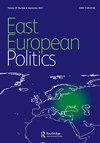The role of organised interests in shaping Croatia's negotiating positions in the Council of the EU
IF 3.1
2区 社会学
Q1 AREA STUDIES
引用次数: 1
Abstract
ABSTRACT The relationship between interest groups and national governments in shaping the decision-making in the Council of the EU is still largely unobserved. By focusing on the case study of Croatia, this article contests the general assumptions of liberal intergovernmentalism about the process and character of national preference formation and demonstrates that economic and societal interests do not have primacy in influencing a national government’s positions in the Council. It is argued that the legacy of a country’s EU accession process, coupled with weak oversight and accountability mechanisms, are among the most important factors in explaining the government's non-inclusive management of EU affairs.有组织的利益在塑造克罗地亚在欧盟理事会的谈判立场方面的作用
利益集团与各国政府在欧盟理事会决策过程中的关系在很大程度上仍未被观察到。通过对克罗地亚的个案研究,本文对自由政府间主义关于国家偏好形成过程和特征的一般假设提出了质疑,并表明经济和社会利益在影响一国政府在理事会中的立场方面并不具有首要地位。有人认为,一个国家加入欧盟过程的遗留问题,加上薄弱的监督和问责机制,是解释政府对欧盟事务的非包容性管理的最重要因素之一。
本文章由计算机程序翻译,如有差异,请以英文原文为准。
求助全文
约1分钟内获得全文
求助全文

 求助内容:
求助内容: 应助结果提醒方式:
应助结果提醒方式:


